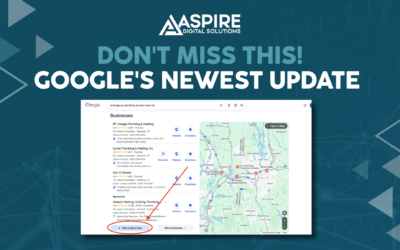Now more than ever, small businesses are building an online presence within their local communities. In a time of uncertainty, large organizations have struggled to stay open while local consumers have continued to positively impact several small business owners.
Reaching your local consumer can be tricky in a digital world. We recommend a digital marketing strategy that includes local SEO. We’ll help you execute a killer strategy using the following tactics:
Get Active on Google My Business
Google My Business (GMB) is a free platform that can help small businesses show up more readily in local search results. Google provides several features within this tool, including the ability to list your location and contact information, products or services, images, and business hours. You can even share business updates, create engaging blog posts and respond to online reviews.
Claiming and regularly updating your GMB profile can make it more likely for your small business to show up prominently in SERPs. Appearing in the map pack or local pack can give your business more visibility and significantly increases the likelihood of clicks and conversions. Be sure that your NAP (name, address, and phone number) is consistent across GMB, other local listing directories, and your website.
Target Local Keywords in On-Site Optimization
The way you optimize your website will impact how your business appears in local search results. Instead of targeting broad keywords, focus on more specific, localized search terms. Implementing these keywords in your on-page optimizations, blog content, URLs, and organically throughout your landing pages will help you reach customers in your area searching for solutions.
Generate and Respond to Reviews
Online reviews are crucial for small businesses operating in the digital age. We find that consumers prefer an online review over personal recommendations from a friend or relative. Customers would rather see a few negative reviews than a company profile with no reviews at all. Remember, a bad review does not equal a bad business.
We suggest obtaining and responding to reviews on Facebook, Yelp, GMB, and other online platforms relevant to your industry. Customers want to see a variety. Get in touch with past customers and ask them if they are willing to leave you some honest feedback. You will be surprised at how willing people are to share their experiences!
Make sure to respond to all reviews, as well. If you receive one that seems less-than-stellar, be sure to reply in a way that shows empathy and your dedication to customer service, leadership, and brand values. Never get defensive, ignore a negative review, or attempt to delete what a customer has written. Ultimately, other customers care more about how you react more than the fact that it exists.
Make Your Website Mobile-Friendly
All technical aspects of your site should support your SEO strategy, and that includes a responsive design. When your website creates barriers for users, any effort made to implement local SEO through on-site optimization, reviews, or local listings will not help.
More users interact with websites via smartphones and other mobile devices to search. A non-responsive website can cost you traffic. Focus on a clean navigation structure, concise content, and clear calls to action for your user to convert. Keep in mind that unnecessary pop-ups will delay site speed and deter your user from completing their journey.
Creating an effective local SEO strategy will benefit your online presence. These local SEO strategy tactics are not a one size fits all model. Aspire Digital will identify best practices for your business and help create a killer strategy!
Ready to grow your online digital presence? Contact us today!








0 Comments